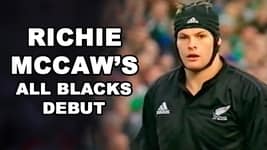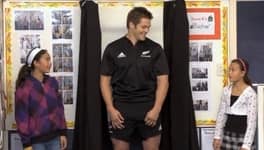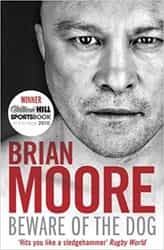Here in Part II of my Top 10 best rugby biographies, I shall discuss books #5 to #2:
#5. Mike Brewer: The authorised biography – Mike Brewer (1995)
Outside New Zealand, Mike Brewer is probably one of the least known or recognised among the top All Blacks. But within the country, and especially in the highest echelons of the game, the loose forward was one of the most influential All Blacks of his time.
Not only was he a highly versatile player, playing all three backrow positions for the All Blacks, Brewer was also an on-field thinker and strategist, and was captain of both provinces he played for, Otago and Canterbury.
Indeed, according to All Black flanker Josh Kronfeld, there was a definite hierarchy and pecking order in the New Zealand squad at the 1995 Rugby World Cup – and Brewer and captain Sean Fitzpatrick alone filled the highest tier.
Outstanding player though he was, Brewer was unlucky in that he played at a time when New Zealand had exceptionally good backrow forwards, and his versatility perhaps worked against him. The leading openside then was Michael Jones, while blindside was filled by Alan Whetton. At No 8, the formidable Wayne Shelford reigned supreme until Zinzan Brooke took over.
Brewer was also unfortunate in terms of injuries, missing both the 1987 and 1991 Rugby World Cups when he was in fine form. Injury was the reason he missed out on the All Black captaincy after the 1991 RWC, and new coach Laurie Mains – Brewer’s mentor at Otago – picked Fitzpatrick to take over from Gary Whetton instead.
But Brewer did get to play in a Rugby World Cup in the end.
In 1995, he was blindside flanker in an outstanding RWC backrow trio which included Kronfeld at openside and Zinzan Brooke at No.8. He played in all the key matches, including the classic 45-29 semifinal hammering of England, in which Brewer can be seen clapping in some of the tries as they were scored (perhaps because they were moves worked out in training that bore fruit in the match).
In the final, though, the All Blacks ran into the Springboks, Nelson Mandela and a bout of food poisoning before the game.
Though they lost 15-12 in extra-time, that New Zealand team still remains, in many minds, the best team at any World Cup to not win the trophy.
The Authorised Biography is an insightful and intelligent read that goes beyond the usual cliches and platitudes found in rugby biographies. Lots of insights, forthright views and plain speaking.
#4. Confessions of a Rugby Mercenary – John Daniell (2009)
If you want to know what goes on in the life of the journeyman professional rugby player, then this is the book to read.
Daniell was perhaps more than a journeyman. He was a decent player who made it right up to the New Zealand Under-21 team, but who couldn’t crack the All Blacks – relatively few do, to be fair.
He ended up studying at Oxford university and playing professional rugby in France. This meant living largely in provincial France. And while that may sound idyllic – a rustic life of baguettes, cheese, wine and escargot – the rugby soon brings you back to brutal reality.
Among the curious realities of the French club scene is that the home team usually wins. Not because they rise to the occasion before a homecrowd, but because the visiting team prefer to get away in one piece and are happy to concede.
This was difficult for a Kiwi like Daniell to accept at first, but needs must.
There is also a lot of discussion in the book about that horrible practice of eye gouging, which seems to be part and parcel of the French game. This happens even at the highest levels, as the Kiwi and Australian teams at RWC 1999 will attest.
It is a tough life, French rugby, as players fight for their contracts, for competition points and to keep their careers going. Rugby is not awash with cash, so life for the non-superstars can be a genuine struggle. Of course, you might say, life is tough for journeymen tennis players and golfers too – but the risk to life and limb for them are not quite the same.
Daniell, a very good writer, talks about the camaraderie and humour universally found in the game, amid the harshness that is French club rugby. A gritty but satisfying read.
#3: The Real McCaw: The Autobiography – Richie McCaw (2015)
The Real McCaw was a real surprise in many ways.
I had expected it to be, like many books by the best players, utterly bland and lifeless. Now that his career is over, I thought it would be merely a recitation of the highlights of Richie McCaw’s career and his view of them as they happened.
It didn’t help that McCaw was never one of rugby’s great talkers, and his public pronouncements gave little away. They were great examples of words uttered but saying very little.
There was that old dictum of mine too: that the better the player, the less interesting the book. And McCaw, in the pantheon of the greatest All Blacks of all time, is now regarded as the very best.
But very early in the book, it is clear that this was a different kind of biography, written as it was in conjunction with Kiwi playwright Greg McGee. The prose is spare but possesses a literary quality rarely found in sports books, let alone rugby biographies. And the stories and tales told are revealing, mainly because not too much was known about the man beforehand.
Through the book, though, you learn that behind that cliched gruff exterior that McCaw displayed – was it put on? was it for real? still not sure – is a sharp mind belonging to one who just preferred to let his actions do the talking.
He was the top student of his school and won a place to study medicine. But he chose instead to study agricultural science so that he could follow in his father’s footsteps. And because studying at the university offering that course was closer to where he wanted to play his rugby.
Gift of the GAB
Like many Kiwi teenagers, becoming an All Blacks was something McCaw wanted to aim for. And once he got selected for the NZ under-19s, he and his uncle mapped out the targets he would have to hit. They also worked out what he had to do to achieve their ultimate aim: for him to become a GAB – something McCaw couldn’t quite write out but which stood for Great All Black.
And a GAB he became. He may not have been as spectacular a player as, say, Michael Jones, whom many (including me) regard as the better flanker. But he was indestructible, as a leader you would want in the trenches, and someone who did his job to perfection.
His record speaks for itself: in a very competitive rugby country, he was the first All Black to play 100 tests, and retired with 148 caps – a world record. He captained New Zealand 110 times – more than twice that of his closest rival, Sean Fitzpatrick, who led the All Blacks 51 times.
He also achieved all that despite two major setbacks early in his career: losing in the semi-final to Australia in his first World Cup, in 2003; and losing in the quarterfinal four years later in his first World Cup as captain – New Zealand’s worst performance at the World Cup.
He and his team redeemed themselves in the most testing of circumstances in 2011. Not only were they trying to break a 20-year World Cup-less streak before a demanding home crowd, they were then also hampered midway through when they lost star playmaker Dan Carter through injury, followed by his deputies Colin Slade, and then Aaron Cruden in the final itself.
Their tough and ultimately close win, 8-7 in the final against France, didn’t come without a cost to McCaw, though.
He had broken a bone in his foot early on, but refused to let any medical personnel see the injury, as they would have been obliged to report it and treat it. Instead, he kept the foot under wraps, literally, and trained minimally between matches. He revealed the foot to the coaches and staff only after the win was secured. It was apparently double its size and of a strange colour.
Time to exhale
The 2015 World Cup, in contrast, was mostly smooth sailing, and provided a perfect farewell not just for McCaw but several other stalwarts. Unlike in 2011, this win was New Zealand retaining the trophy while being able to exhale and enjoy themselves.
Afterwards, it was also time for McCaw to breathe and indulge his other love: flying. In his case, it was flying gliders, something he did regularly to unwind and get away from the game.
No surprise that upon retirement, he got his helicopter pilot licence, and now flies for a living, including milk delivery runs and rescue missions.
As post-playing gigs go, that’s a pretty hard one to beat.
Sideviews
- Video 1: Richie McCaw’s debut
- Video 2: Richie McCaw surprises kids
#2. Beware of the Dog: Rugby’s Hard Man Reveals All – Brian Moore (2010)
“Pitbull — they call him Brian Moore”: those words by commentator Nigel Starmer-Smith summed up the player that was the ultra-aggresive and combative former England hooker, whose nickname was Pitbull.
It was a competitiveness and belligerence that bothered on the pathological, Moore admits, and the reasons for that, he revealed in Beware of the Dog, were probably two childhood traumas that he thought he kept safely hidden away.
Beware of the Dog is actually Moore’s second autobiography. The first, Brian Moore: The Autobiography, was co-written with award-winning Sunday Times journalist Stephen Jones, and came out in 1995, around the time Moore hung up his boots as far as international rugby went.
It was a perfectly readable book, but mainly covered Moore’s playing career until then. There were obviously a few personal things Moore wasn’t ready to share yet.
Fifteen years later, with Beware of the Dog, the story is substantially different.
We still get interesting details of the highlights of his playing career: the three Five Nations Grand Slams and two British Lions tours, plus a World Cup (1991) that probably slipped away through a bad choice of tactics in the final and one (1995) where they were met a cyclone named Jonah Lomu in the semifinal.
He was also named World Player of the Year in 1991 – not too shabby for a hooker playing in an era when the likes of David Campese, Jeremy Guscott, Grant Fox and Philippe Sella were running around.
Writing as therapy, and finding Gollum
But Beware of the Dog, which was written by Moore himself, also revealed two things that he surmises could explain his sometimes self-destructive behaviour. One, that he had been given up for adoption when he was a child. And two, that he was abused when he was about 10 years old.
The book details the emotional turmoil he goes through as he tried to trace his real parents – a Malaysian father and an English mother – and is an exercise he doesn’t recommend.
Moore also recounts the horrific ordeal of being betrayed by a teacher who was also a family friend.
Writing the book, he has said in interviews, was a form of catharsis, though the demons are not fully gone. He has, he says, an alter ego that he calls Gollum – after the Lord of the Rings character, obviously; Moore is a Tolkien nerd – who still hangs around and judges his actions.
Being the sharp-tongued, argumentative fighter that he is, it is no surprise to learn that Moore worked as a lawyer. One who fought his cases with the same pugnacity with which he played.
But rugby kept calling and he soon gave up practising law and turned to full-time punditry and writing newspaper columns. He writes in the book about his life as a rugby commentator, a role in which he doesn’t hold back, whether it be criticising players or referees.
And since, with his playing record, he had the grounds to criticise players, he felt he had to get on similar footing in order to criticise referees. So he got himself qualified as a referee – perhaps all sports commentators should do the same.
Beware of the Dog won the 2010 William Hill Sports Book of the Year award, beating what was considered one of the strongest shortlists ever, including Andre Agassi’s Open. It also won the Best Autobiography category at the British Sports Book Awards in 2011.
It must have taken one helluva story, then, to push Beware of the Dog off the Number One spot on my Top 10 best rugby biographies. But I think the next book really does deserve the top ranking.
Next page: My Number One rugby biography: The Talented Mr Ripley








This is a fascinating read and I would so have loved for my late mother to have been able to read these book reviews. She was an avid rugby supporter and could tell you who was playing, it was great to watch her intensity as she watched a match.
Through her and my late father this love for watching rugby rubbed off on at least two of their children. My poor son-in-law sometimes has me around while he is watching and I am afraid it becomes quite a noisy affair with us both yelling at the ref mainly.
Thank you for the insight into the lives of these great players.
Glad to hear your mother enjoyed the game. I would have loved to have gotten her perspective on the different players.
Your son-in-law must love having you over on the major game nights.
Thanks for sharing your website. I like reading books even though it does not have to do with my favorite sport. They probably have stories that are inspiring.
I’m sure you’ll find them as inspiring as the players in your favourite sport.
It’s good to read biographies of people, particular to these Rugby Players it seems most of them are writers and are award winners.
Although I don’t really watch Rugby players and I don’t understand how the game is played I do appreciate the players in their sportsmanship.
The more we will know them by their biographies because this is the closest way how they will depict themselves to the people around them.
Yes, a lot of the rugby union biographies I have on my top 10 happen to be by people who can write well. Most of them are self-written i.e. no ghost-writing – which is not a bad thing. It’s just indicative of the talent at play here.
Hey,
Lots of interesting choices there. And very good summaries of the books. I have a couple questions though.
For someone who is relatively new to rugby in general, which one on these biographies would you recommend I start with?
Which one is the definitive must read before all the other one?
Thanks for the help.
I’d say read:
#1 – Ripley’s World (this will be in Part III which I’ll be publishing tomorrow). He played for love of the game when it was still an amateur sport. Also a great read on men’s health and squaring up to adversity.
#2 – Brian Moore. His is more of a human story. Damn good read. Don’t have to be a rugby fan to get into his book.
#4 – life of the usual professional rugby player; what playing professional rugby is like for a journeyman.
In fact, these 3 books I can definitely read again.